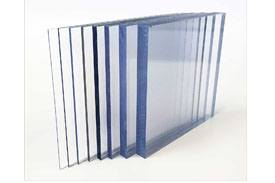
Polycarbonate moulding and extrusion materials are a class of thermoplastic polymers renowned for their exceptional strength, transparency, and impact resistance. Polycarbonate is characterized by its excellent dimensional stability, high heat resistance, and versatility, making it an ideal choice for various applications. In moulding processes, polycarbonate can be moulded into intricate shapes with precision, offering designers flexibility in creating complex parts for various industries such as automotive, electronics, and consumer goods. In extrusion processes, polycarbonate can be formed into sheets, rods, tubes, and profiles, catering to applications in construction, signage, glazing, and protective barriers. Polycarbonate materials are highly regarded for their optical clarity, making them suitable for applications where transparency and visibility are critical, such as safety goggles, aircraft windows, and display screens. With its superior mechanical properties and optical clarity, polycarbonate remains a popular choice for moulding and extrusion applications across diverse industries.
IS 14434:2023 is a significant standard for polycarbonate as it provides crucial specifications for polycarbonate moulding and extrusion materials. This standard outlines comprehensive guidelines for manufacturers, covering essential aspects such as chemical composition, physical properties, and processing requirements of polycarbonate materials. By setting clear parameters for factors like thermal stability, impact resistance, and dimensional stability, IS 14434:2023 ensures that polycarbonate materials meet stringent standards for consistency and suitability in various applications, including automotive parts, electronics, and construction components. Compliance with this standard ensures the quality and reliability of polycarbonate products and promotes compatibility and interchangeability among different manufacturers and end-users. Adherence to IS 14434:2023 facilitates regulatory compliance and enhances market acceptance by providing a standardized framework for polycarbonate producers and consumers.
Note: Obtaining the ISI/BIS Certification is a mandatory requirement for manufacturers of Polycarbonate Moulding And Extrusion Materials Specification to sell their products in the Indian market.
Manufacturers are required to obtain ISI/BIS certification for their Polycarbonate Moulding and Extrusion Materials Specification to market and sell these products within India. This certification serves as a vital confirmation of compliance with specific quality and safety standards mandated by the BIS for the production and distribution of polycarbonate materials intended for moulding and extrusion applications. Without the ISI/BIS certification, manufacturers face potential legal ramifications and obstacles in accessing the Indian market. This certification process underscores the significance of ensuring the integrity and performance of materials used in various industries, instilling confidence among stakeholders in the manufacturing and engineering sectors regarding their suitability and adherence to Indian standards for usage and distribution.
Indian Standards Institute, or ISI was renamed the Bureau of Indian Standards (BIS) in 1987. The official mark that the Bureau of Indian Standards provides for manufacturers of various goods is the ISI Mark. It is used to indicate compliance with Indian standards (IS) set by the Bureau of Indian Standards (BIS) and has been used as a conformity marking for industrial products. Manufacturers received permission from BIS to use the ISI Mark on items that comply with relevant Indian requirements through the product certification program.
Only manufacturers (domestic or foreign) who produce the finished product will be awarded ISI Certification. This will not be given to any product importers, traders, dealers, or distributors.
The following documentation is required to get an ISI certification:
For more detailed information, please click here.
There are two approaches for Indian manufacturers to become certified with the ISI Mark:
Regular Procedure
With the possible exception of cases deemed "All India first," which might take up to 180 days, the licensing procedure is expected to be finished in 120 days. This timeline starts on the day the application is received, assuming that at different points in time the documentation, unit assessment, and product conformance are all deemed acceptable.
Step 1: Manufacturing Unit Customization in Compliance with Applicable Indian Standards
Step 2: Submission of the Application Form
For more detailed information, please click here.
Simplified Procedure
This is a much faster process than the standard procedure. After a factory inspection is deemed satisfactory and the initial evaluation establishes that the sample complies with the applicable Indian Standard(s), the license application process is expected to be finished in 30 days.
Step 1: Adapting the Manufacturing Unit to Comply with the Relevant Indian Standard
Step 2: Sample Testing
For more detailed information, please click here
The process of obtaining ISI Mark Certification for Foreign Manufacturers typically includes the following steps:
Step 1: Application
Step 2: Query Raised (If Any)
For more detailed information, please click here.
Brand Liaison provides helpful support for achieving ISI Mark Certification. Among our offerings are:
Please click here to get in contact with our team of specialists for a deeper explanation of the paperwork and steps needed to get ISI Mark Certification.